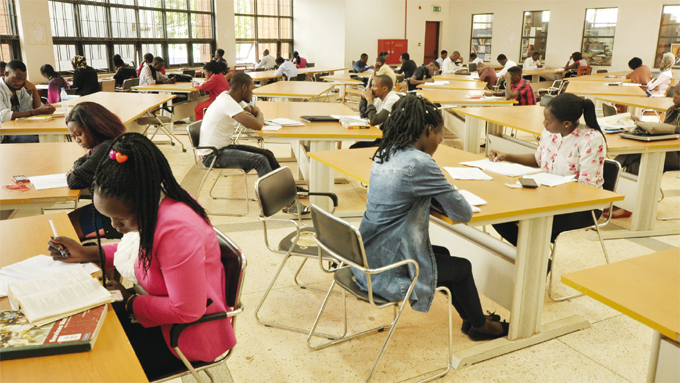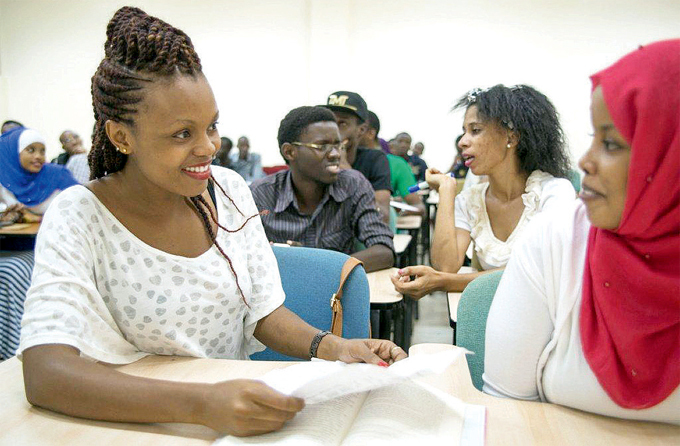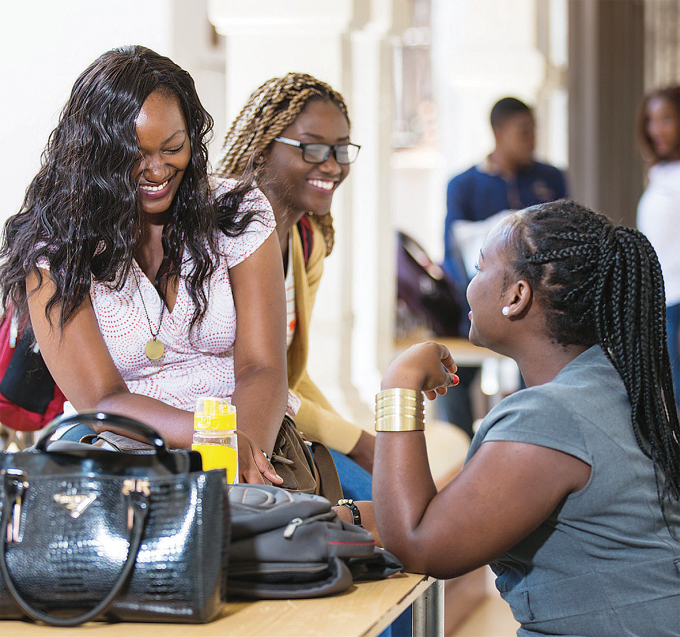University guide special edition 2018-2019
Don't miss out on tips and opportunities for most marketable skills
Be prepared, get educated
NOWADAYS, jobs are taken by individuals who successfully meet the demand of potential employers; based on prescribed specifications and qualifications.
The demands may include writing an application, doing theoretical and or practical and oral interviews. This marks the beginning of a valuable higher education, giving an applicant empowerment to use the power of language and knowledge to articulate contextual ideas to win the position advertised.
Education in general, empowers the individual with basic skills of literacy and numeracy. This explains why the basic level of education makes one eligible for certain levels of jobs. Higher education usually builds on basic skills, especially for technically related work.
Higher education further, through university education, provides skills for creative and critical thinking as well as global competitiveness. This is why higher education training enables one adapt quickly to any relevant job opportunity.
Talent is not enough without knowledge and competence. Job opportunities, on the other hand, should support an individual, their family and the community; based on one’s level of training or re-training.
 Students of Makerere University Business School (MUBS) reading in the university’s main library. Higher education provides skills for creative and critical thinking as well as global competitiveness
Students of Makerere University Business School (MUBS) reading in the university’s main library. Higher education provides skills for creative and critical thinking as well as global competitiveness
Not all jobs need higher education training. This explains why there are many jobs that are not suitable for graduates. If incidentally they are filled by graduates, often there is a high turnover of employees. Nowadays employers are offering jobs that force many people to hide their levels of training and competencies.
This is an indication that the job market is under employing graduates of higher education. Such persons if employed tend to become frustrated and may leave that job easily. On the other hand, the world of work has created the impression that higher education as opposed to individuals; is entirely responsible for the apparent poor performance at places of work.
Employers must show interest in their contribution to training of future employees, at all levels! This happens in other parts of the world! Higher education is a gateway to better and well-paying jobs, especially where such training gives one a competitive edge.
Higher education also gives one a better chance of mobility beyond their current job or location. Higher education also prepares one for jobs which are not yet created, especially those based on entrepreneurship and innovation. Higher education builds a sense of confidence, better judgement, enquiry (positive questioning, interrogation and research), thinking and exploration as well as a desire to know more with minimal retraining.
Knowledge, familiarity of outcomes elsewhere in the world and ability to solve difficult issues is responsible for excelling in service delivery. Lastly all that will not guarantee integrity and ethical conduct; since the society one lives in, has greater influence on him or her – educated or not! All the same, it is better receive higher education than not, as opportunity comes to those who are prepared!
The writer is the executive
director for the National
Council of Higher Education
Future jobs: Technology and emotional intelligence key
With technology taking over most sectors of the economy, experts predict a revolution in the job market. The nature of employment and courses offered at university are set to change to meet the demands of sky rocketing populations and pressures on the limited natural resources, writes Conan Businge
Times are changing and so is the job market. Are you a student joining the university this year? Take note that in the next 10 years artificial intelligence, science and technology will reign in the job market as automation and Internet usage take centre stage, say experts.
“The future of work asks us to consider the biggest questions of our age,” says PricewaterhouseCoopers (PwC). In a report, the global audit company asks: “What influence will the continuing march of technology, automation and artificial intelligence (AI) have on where we work and how we work?”
In the report, The Workforce of the future (The competing forces shaping 2030), PwC wonders whether humans will need to work at all and, if so, what role they will play in an automated world.
“The shape that the workforce of the future takes will be the result of complex, changing and competing forces,” the report says. It said the transition towards automation will not be easy and will be influenced by regulations and laws, governments that impose them, consumer trends and worker sentiment. “The outcome of this battle will determine the future of work in 2030,” the firm adds.
 Robots will not, however, take on jobs that involve emotional intelligence
Robots will not, however, take on jobs that involve emotional intelligence
For sure, says PwC, ‘thinking machines’ are replacing human tasks and jobs, and changing the skills that organisations are looking for in their people. “These momentous changes raise huge organisational, talent and HR challenges,” the report adds.
Given this situation, experts argue, soft skills, emotional intelligence and other logic will be key assets for any employee and only the smart graduates, who apply them, will keep their jobs as competition with both machines and humans soars. Norah Bwaya Njuba, the co-founder of the Institute Work, Culture and Ethics, agrees. “Careers where you apply emotional intelligence other than logic will be needed because anything that is logic is going to machines.”
Njuba defines emotional intelligence as “the something in each of us that affects how we manage behaviour, navigate social complexities and make personal decisions that achieve positive results”.
However, it does not mean that high IQ is all you need to make it in life. To the contrary, studies show that people with average IQs outperform those with the highest IQs 70% of the time. CLICK HERE FOR MORE ON THIS STORY
How to graduate with a first class degree in idiocy
By Carol Natukunda
First things fi rst! You are now on your own. With no curfew, no set family mealtimes, raise your beer high and toast to a life of absolute freedom! It has been years of strict schooling.
You were punished for just about anything, including giggling in class. You were suspended for answering back at a teacher. That, right now, is history.
Welcome to a world where there is no timekeeper to ring the bell for the next lesson. That annoying teacher on duty, who was always on your case to ensure you attended classes, is history now.
At campus, no one in the world cares whether you skip a lecture or not. Yes, you read right. You can take even an entire month without stepping into the faculty. So, on a rainy morning, do pull over the blankets and snore away like there is no tomorrow. Switch off your phone.
You see, there are always those bothersome coursemates who will most likely WhatsApp, worried to hell that you will fl unk. It is none of their business. Make no effort to know which topics were covered in your absence.
Do not even photocopy the handouts. You are free to do anything you want, remember? Ahh, maybe you are scared to hell that there might be a random roll call. Someone might have actually told you that lecturers have this weird habit of passing around sign-in sheets for those who attended class.
Look, those sheets really have nothing to do with you. The lecturer only needs them to claim his pay, you see. He can do that without your signature. Move over to coursework. Why do lecturers assume you have money to print coursework and a dissertation?
For crying out loud, the money you pay at the printer could buy you two, three bottles in Wandegeya! But you do not have to whine over this. Make your own rules. Just do not do the coursework! Go catch that cold beer and spend the night in club breaking a sweat.
 For a fool, the university phase is basically all about having fun with friends
For a fool, the university phase is basically all about having fun with friends
The next day, you will show up for class with bloodshot eyes. Your head spinning! Why did you enrol for a day programme, anyway? It is diffi cult to concentrate on anything the lecturer is saying.
You will sit at the back of the class. And, when you cannot contain it any longer, quietly step out and go catch some sleep.
If that lecturer tries to ask you a question, give him a piece of your mind. It just might be the shortcut to getting your indefi nite suspension. Later in the evening when the hangover is hitting you hard, you can go back to your kafunda and start from where you stopped.
Heck, you are a ‘star’ by now. You are making friends fast, some of them corporates. The stench of the beer and smoke hangs in the air. Tonight, it is nothing but good music, karaoke and barbecue.
Everyone is having a blast. You dance like there is no tomorrow. Life is good! Life is a vicious cycle with no end in sight, you wake up the following day, groggy as hell from a night of hard partying. Your phone just received a text.
Your squad just added you to their WhatsApp group. One of the group members is inviting you for a house party over the weekend. You roll over, ready to type out, a “yes’. While these friends are generous, it should be your turn to pick the bill.
Do not worry if you do not have pocket money. You could get a job in a nightclub as an usher or dancer. There you will live off the handsome tips and leftovers from drunken patrons. By daybreak, you will be too drained to attend of this mess requires more than just divine intervention. CLICK HERE FOR MORE ON THESE TIPS
Is your course, university accredited?
By Conan Businge
Four years ago, the country woke up to news that some public and private universities in the country were teaching unaccredited courses.
At least five universities had defied National Council for Higher Education (NCHE) and continued to teach unaccredited programmes.
According to NCHE, these universities had been given five years to review their programmes before submission for accreditation. However, the deadline expired without the institutions responding to NCHE demands.
This meant that whoever had attended those courses in the particular universities, was set to have his or her qualifications nullified. Luckily, it did not get to this as the universities were given a grace period.
Just a year before this, NCHE had closed three universities for noncompliance of the set standard of operation by the Government. NCHE ordered the closure of Luweero University, Central Buganda University and Fairland on grounds that they were not recognised. Students, who were studying at these institutes had to pay a high price.
 Students of International University of East Africa interacting in a lecture room. One should research about the institutions they intend to join to avoid ending up in unaccredited universities or joining unaccredited programmes
Students of International University of East Africa interacting in a lecture room. One should research about the institutions they intend to join to avoid ending up in unaccredited universities or joining unaccredited programmes
You can avoid such a scenario, by ensuring that before being enrolled, your course is accredited. Busoga University was closed a couple of months ago too. Prof Opuda Asibo, the National Council for Higher Education executive director, says:
“Students must ensure that their courses are accredited. But most importantly, ensure that the university is accredited to be teaching you.” Unaccredited academic degrees or other qualifications from unaccredited institutions may not be accepted by the civil service or other reputable employers.
He advises students to research the credibility or legal status of the programme and university, by visiting the NCHE offices, the website or even going to the respective universities.
Accreditation is a process of validation in which colleges, universities and other institutions of higher learning are evaluated. The standards for accreditation are set by a peer review board, whose members include faculties from various accredited colleges and universities.
The board aids in the evaluation of each potential new school accreditation or the renewals of previously accredited colleges/ schools. In order for potential colleges to proceed with the accreditation process smoothly, they must meet the standards set by the peer review accreditation boards.
CLICK HERE to see list of accredited institutions
Bid farewell to moving with wads of cash with electronic payment
By Billy Rwothungeyo
The writing is on the wall around the globe: the use of physical cash will continue to decline in importance, driven by both human determination and technological advances.
In a 2012 US survey of internet experts, 65% of respondents said that: “By 2020, cash and credit cards will have mostly disappeared from many of the transactions in advanced countries.” David Wolman, author of 2013 book The End of Money, went so far as to call cash “an anachronism”.
Cash is also a burden for businesses, since it is more expensive to insure, count, store, manage and transport. It is risky. It attracts crime (including violence and fraud). In a paper, Going Cashless in Universities and Colleges, MonitorIt, a fi nancial consulting fi rm, notes that: “Cash is slow — and at busy times in retail environments, slow processes lose sales and damage the brand.”
It adds that: “A single cash transaction requires getting the money out of a wallet/pocket, counting it, handing it over, waiting while the sum offered is checked, receiving any change, checking the change and putting it away (compare this to a contactless payment, which takes about a second).”
So, why should you continue moving through town with large sums of just to go and line up in a bank; when paying university tuition or other fees? Cashless transactions. Why should you risk the wrath of Kampala’s criminal gangs when you can pay your fees electronically?
There’s technology that transforms the way we receive and spend money, enabling both consumers and businesses to reduce their dependence on cash while making life easier, more secure and less expensive for everyone. Here are some of the ways to do transactions through digital platforms.
 University students use a laptop and a phone. As the economies become cashless globally, parents are urged to use contactless payment transactions such as EFTs
University students use a laptop and a phone. As the economies become cashless globally, parents are urged to use contactless payment transactions such as EFTs
ELECTRONIC FUNDS TRANSFER
Electronic Funds Transfer (EFT) is one channel through which you can pay your university fees. EFT involves transferring money from one fi nancial institution to another, through computer-based systems.
For example, if you have a bank account with Bank X and you wish to pay fees to your university that has an account in Bank Y, instead of withdrawing money from Bank X to take to Bank Y, you simply authorise your bank to transfer the money.
EFT was introduced in Uganda way back in 2003; by Bank of Uganda to enable easy, fast and reliable payment and collection of funds. Initially, only corporations embraced the payment method. However, in recent years, academic institutions such as schools and universities are embracing its use.
The payment system comes in handy for parents who do not trust their children with large amounts of money to take to the bank, says Allan Okopa, an Information Technology specialist. “EFT means you do not have to move around with large sums of money, so no conman can take it,” he says.
“The system is also fast. There are no delays. You do not have to wait for several days for money to be deposited on your account, and in this case, on the university’s account. So you do not have to worry about not clearing in time.” Cashless transactions are largely reliable for the odd times when the providers are carrying out upgrades. CLICK HERE FOR MORE ON THIS STORY
Services a good hostel must offer
The New Vision survey drew students from Makerere University (MAK), Makerere University Business School (MUBS), Uganda Christian University (UCU), Kyambogo University (KYU), Kampala International University(KIU) and Nkumba University (NU).
As a student who is joining the university this year, these are some of the attributes you may have to pay attention to. These may vary across the six universities, although they are not signifi cantly different.
A student at Makerere University will consider such factors as proximity to campus, access roads, constant water supply, how spacious a room is, back-up electricity, availability of a warden, fairness in hostel fees and timely attendance to student’s issues.
At MUBS, in addition to proximity, access roads, students also considered availability of security guards, neighbourhood security, connection to national power grid and constant water supply. These same attributes featured prominently for the students at KYU, KIU, NU and UCU.
 For most students, having a hostel shuttle may not be a key factor when choosing a hostel, but it eventually affects their level of satisfaction with the hostel
For most students, having a hostel shuttle may not be a key factor when choosing a hostel, but it eventually affects their level of satisfaction with the hostel
HYGIENE IS KEY
In most of the hostels, poor sanitation in the bathrooms and toilets was one of the major sources of dissatisfaction for most students. Marked as a red spot (most important factors when choosing a hostel and yet students ranked them poorly in terms of satisfaction) in the survey, this is an area that hostels need to work on urgently.
Just as was in the 2015 survey that found hostels to lack proper cleaning services, the trend seems to have gone unchecked to date, which contravenes the KCC Ordinance.
SHUTTLES
Much as one would think it healthy to take a walk to and from campus, consider a functional shuttle important. Hostels with shuttles ranked highly according to the survey. For most students, it may not be a key factor when choosing a hostel, but it affects their level of satisfaction with the hostel. CLICK HERE FOR MORE ON THIS STORY
Beat the stress of job-hunting, go into self employment
By Geoffrey Mutegeki
Getting a job after graduation is becoming increasingly difficult, especially at a time when the country is grappling with a high rate of unemployment.
Statistics from the Uganda Bureau of Statistics (UBOS) indicate that more than 40,000 people graduate from Ugandan universities each year. However, one can beat this by thinking outside the box.
What about self-employment? Consider potential ideas based on your talents or interests then let those ideas act as a springboard for your own creative brainstorming with your peers and the other significant people that are in your life.
When Felix Kagame graduated with a first class degree in social sciences in 2011, he expected to land a lucrative job at one of the reputable organisations in the country. Two years down the road, Kagame was still job hunting and could not figure out why he was not getting employed despite having a first class degree.
 Buses in a park in Kampala. Felix Kagame has made a fortune as a bus conductor
Buses in a park in Kampala. Felix Kagame has made a fortune as a bus conductor
He moved from one office to another, contacted friends and relatives for job opportunities, but he was not successful. “I applied to almost all organisations in Kabarole district, but I never got a chance to be employed. I spent two years job hunting,” Kagame recalls.
Having failed to secure a job in the formal sector, Kagame decided to work as a bus conductor in one of the companies in Fort Portal as he kept tabs on job openings in the formal sector. “I opted to do something, however small it was,” he says.
From his savings from the bus job, Kagame has now bought land and is rearing over 60 goats. He has also rented three acres of land and planted eucalyptus trees.
“If you do not think outside the box you may die walking on the streets. From this experience, I have learnt that having a degree should just be catalyst to doing something creative,” Kagame says. In Uganda, few graduates think like Kagame and engage in vocational activities when the job hunting gets tough.
“If an opportunity for formal employment comes, I will take it. However, now I am not going to sit and relax,” he says. John Alijuna, a graduate of business administration, did not wait for formal employment after university. He started frying chapatti in Fort Portal town. CLICK HERE FOR MORE ON THIS STORY
Single sex or mixed hostel?
By Prisca Baike
As students prepare for university, choosing the best hostel is one of the critical decisions to be made.
With the ever-bulging number of students every subsequent intake, university halls of residence can only accommodate a limited number. Besides, many private universities do not have halls of residence, leaving students with two options — to commute from home or go to a hostel.
However, unlike the halls residence where male and female students are assigned separately, for hostels the situation is different. Most hostels admit both male and female residents and only a few are strictly for students of a single sex.
Connie Namataka, who is joining university later this year, says there are no two ways about it, she is choosing a hostel for women only. “For all my time in boarding school, girls and boys have always had separate places of residence and that is what I am used to,” Namataka says.
She points out that living in a single-sex hostel will accord her with privacy. Titus Lusimbo, a third-year student of education at Kyambogo University who has lived in a single-sex hostel since he joined university, says he has had a stress-free experience.
“I don’t have to worry about impressing anyone at the hostel,” Lusimbo says. In comparison, his counterparts in mixed hostels who, he says, may at times want to impress the opposite sex by living beyond their means.
According to Christine Tenywa, a caretaker of a mixed hostel in Nakawa, girls, too, face the pressure to impress boys in mixed hostels. They, for instance, want to furnish their rooms with expensive items such as fridges, flat screen television sets and expensive carpets, which she says is not the case with girls in single hostels.
Agnes Kitui, a student at Kampala International University, says she cannot stand what she calls a ‘toxic atmosphere’ in girls’ hostels. “Girls like gossiping and making others feel inadequate, especially in environments where they are alone,” says Kitui, who observes that girls behave much better when they are around boys. She says all hostels, even those which are mixed, have rules.
For instance, at her hostel, male and female students have different floors, with their own toilets and showers, which accords them privacy. Francis Nkalubo, a custodian at one of the girls’ hostels in Makerere Kikoni, says most of his clients are females from single-sex schools, something he notices from their secondary school identity cards that they present while acquiring rooms. CLICK HERE FOR MORE ON THIS STORY
ADVERTS
HIGHER EDUCATION STUDENTS’ FINANCING BOARD [HESFB]
UNITED STATES INTERNATIONAL UNIVERSITY - AFRICA
ERNEST COOK ULTRASOUND RESEARCH AND EDUCATION INSTITUTE
CLARKE INTERNATIONAL UINVERSITY
UNIVERSITY OF SAINT JOSEPH MBARARA (USJM)
MBARARA UNIVERSITY OF SCIENCE AND TECHNOLOGY (MUST)
MAKERERE UNIVERSITY BUSINESS SCHOOL
[asset_library_tag 387ce08d-11ff-409f-bea9-b467ffe0c2ec,ALL NATIONS THEOLOGICAL COLLEGE AND SEMINARY]